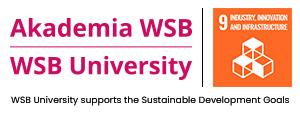Innovative technologies, the metaverse, digitalisation, artificial intelligence or cyber threats were just some of the topics discussed during the first day of the 15th edition of the European Economic Congress in Katowice.
On Monday 24 April, a panel discussion on artificial intelligence was held. It was moderated by Dr Marcin Lis, Prof. AWSB - Prorector for Student Affairs and Cooperation with the Environment at WSB University.
Participants in the debate included:
Marcin Gajdziński, General Director of IBM for Poland, the Baltic States and Ukraine,
Aleksandra Ihnatowicz, expert, National Contact Point for EU Research Programmes, National Centre for Research and Development,
Joanna Jaworek-Korjakowska, Director, Centre of Excellence in Artificial Intelligence, Stanisław Staszic University of Science and Technology in Kraków,
Jan Kleczkowski, Sales Director, Azure Application Innovation - CEE, Microsoft,
Jarosław Królewski, CEO, Synerise,
Rafał Krzyżaniak, Managing Director, Partner, Boston Consulting Group,
Bartek Pucek, CEO, Forward Operators.
PANEL TOPIC: AI as one of the most expansive technologies changing the economy and social life. How will artificial intelligence affect the economy and our daily life - what challenges should we prepare for in relation to its rapid development (infrastructure, communication, transport, production, work, psychology, etc.)? Cooperation between humans and intelligent machines - necessary competences. Concerns and fears related to the autonomy of artificial intelligence.
For 15 years, the European Economic Congress in Katowice has gathered business representatives, CEOs of global corporations, decision-makers from the country, Europe and the world with a real impact on economic and social life, politicians and experts, remaining one of the largest economic events in Central Europe.


